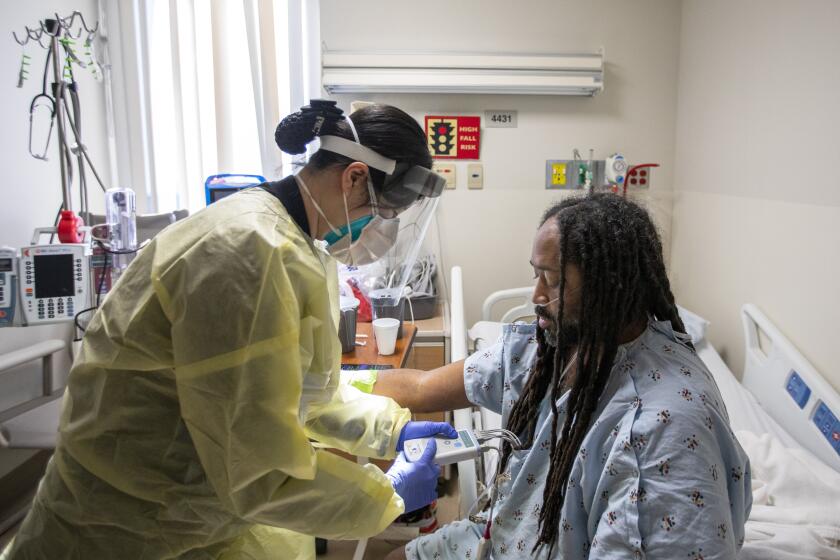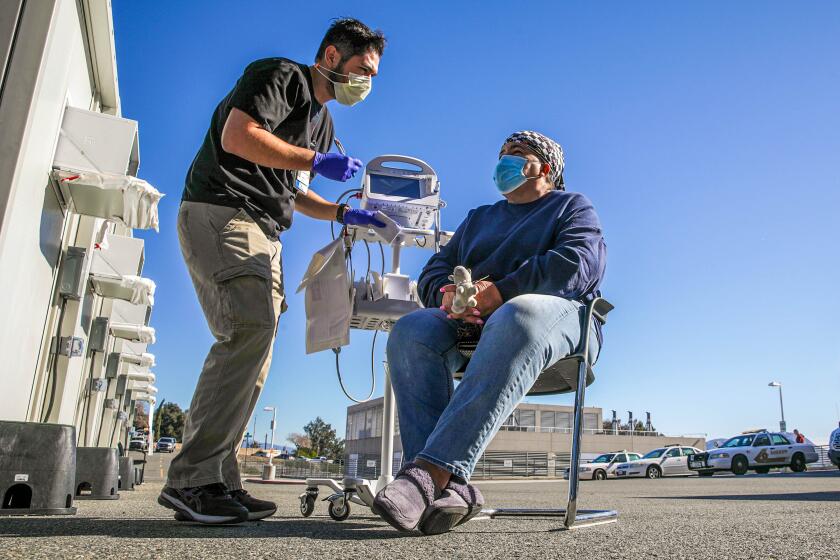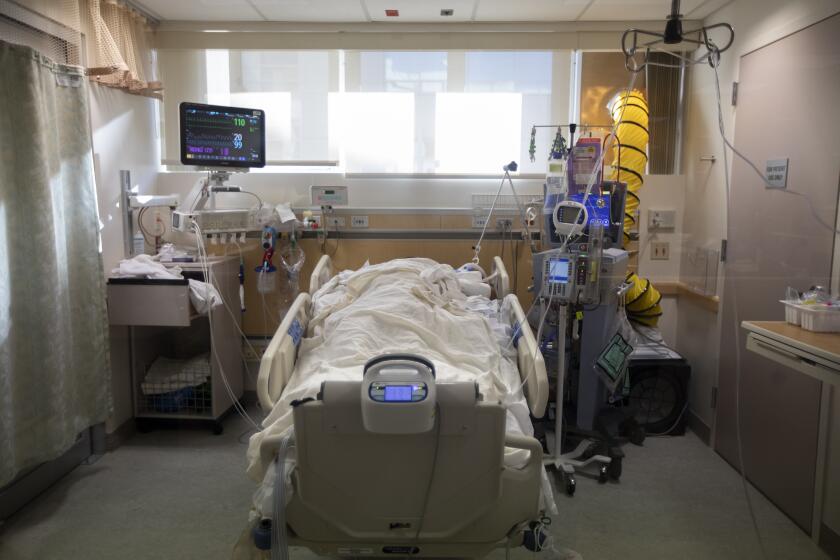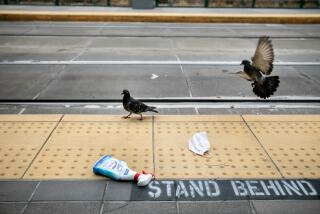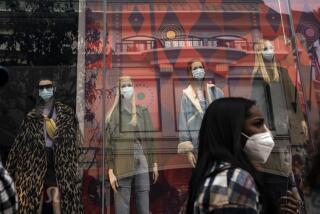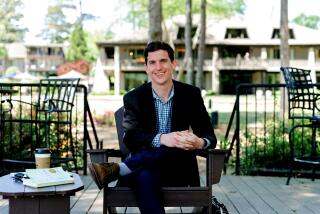Op-Ed: When an asymptomatic, COVID-positive doctor is still treating patients, we’re losing a war
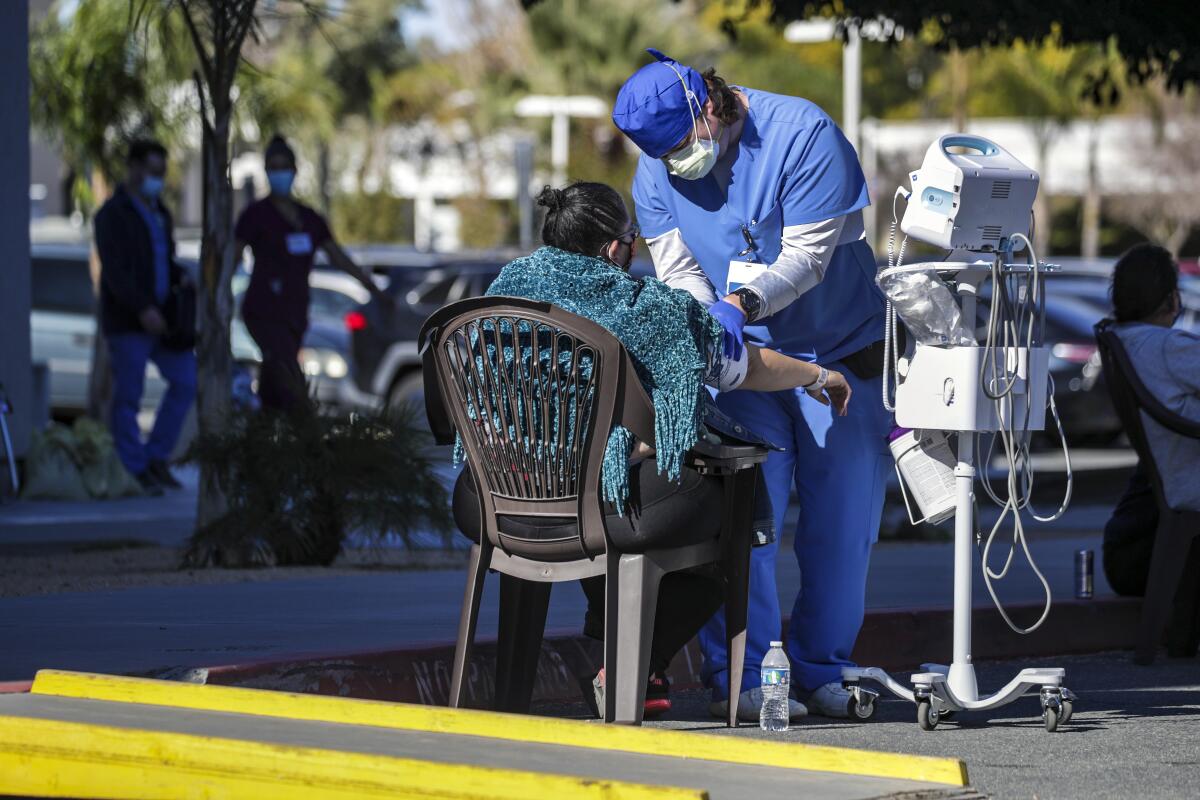
I’ve been dodging COVID since March 2020. Back then, I would have been appalled at having asymptomatic doctors and nurses infected with COVID treating patients, which state officials now say is permissible.
Now I see this as a necessity.
We’re losing this war.
Omicron is surging in huge numbers, a wave bred in the unvaccinated, the uneducated and the uncaring. People are flooding our hospitals during the worst time of the year for ERs: winter, when flu and other respiratory diseases spike.
It’s a rock and a hard place numbers game as Omicron knocks healthcare workers out by the thousands — at a time when staffing is already a big problem. Combined with burnout, retirement and higher paying “travel” jobs to COVID hotspots, this wave has put us in a perfect storm.
Experts say it’s a necessary solution to staffing shortages, yet many workers say the policy could be dangerous.
Lately, we are seeing patients as if practicing for a disaster that has already arrived. In my hospital and so many others, sick patients clog the ER because there is nowhere to put them. The ER overflows into the waiting room and onto the street in tents. Separation of COVID and non-COVID patients breaks down.
If you order labs and there is no nurse to draw them, or send a patient to the CT scanner but have no bed to put them in, what happens? The patient leaves before the scan is read. Sometimes they cannot be found and the news is bad.
The only thing worse is the patient who never comes in because the place is overwhelmed.
My emergency department, and those across California and the country, must stay open and staffed, not just for COVID patients but to treat people suffering from heart attacks, strokes, gunshot wounds, overdoses, suicide attempts and severe injuries.
After two years, hospitals thought they had a handle on treating COVID-19. But Omicron has hit them harder than ever.
For a COVID-positive patient, having a team of positive, asymptomatic caregivers is far better than being untreated. This holds true for all critical patients, who, COVID aside, will almost certainly die without treatment if they stay away due to overcrowding and lack of staff.
Personal protective equipment works both ways, protecting me and my patients. There’s no reason to think that properly used protective gear is riskier than sitting in ER waiting rooms for 12 hours. It’s clearly less risky than playing on a professional sports team.
The Supreme Court decided that most workplace vaccination mandates threaten liberty more than the current pandemic. And it is clear that a large portion of our society refuses to end the COVID war quickly, as they did with previous preventable diseases.
So, here we are, stuck in this crap for the duration until slowly, painfully we get to herd immunity the hard way.
A respiratory therapist’s view of how the worst cases of COVID fare. They rarely end well.
For almost two years we’ve lived under enemy occupation. And the vaccinated will need to continue to adjust, again and again and again, no matter how sick we are of this siege.
It will likely take a few years for the current stalemate to end; for the pandemic to become endemic. During that time some will be forced to do unimaginable things. Like being a healthcare worker when you are COVID-positive but “not sick,” coming to work when common sense says stay home.
I’m shocked that I might end up with COVID but still treat an immunocompromised patient, knowing that there is a risk — however small — that I could harm them.
I could refuse to do it, cite the Hippocratic Oath and not go in.
But I won’t, and I hope my colleagues will make the same choice if asymptomatic and COVID-positive. This is an all-hands-on-deck moment. Again.
It is a hard choice. It goes against most everything I’ve been taught.
One mentor — maybe the best doctor I’ve ever learned from — told me that a simple question could cut through this most complicated knot: What is the right thing to do for this patient, right now?
It is impossible for me to imagine this patient without a doctor or nurse to provide comfort and care; without a respiratory therapist to dial up oxygen when every breath is a fight.
What is right for the heart attack, stroke or gunshot patient? I’m not COVID-positive (yet), but if I am and I feel fine, I should be where I can help them. Even if it feels wrong, it is right at this moment, for me.
Don’t want to get treated by a COVID-positive healthcare worker?
Well, if you’re unvaccinated, good luck — if you get Omicron, you are risking death (the exact odds of this remain unknown) and you are 10 times more likely to need a hospital bed. Those numbers go to almost zero with the jabs.
And if you’re experiencing symptoms of other urgent health issues such as heart attack or stroke, seek treatment despite your fear.
Because this is where we are in the fight. Being treated by a careful, double-masked and gowned doctor or nurse who is COVID-positive but symptom-free makes more sense than suffering the consequences of having no experts where the sick people are.
Mark Morocco is a Los Angeles physician and professor of emergency medicine.
More to Read
A cure for the common opinion
Get thought-provoking perspectives with our weekly newsletter.
You may occasionally receive promotional content from the Los Angeles Times.
